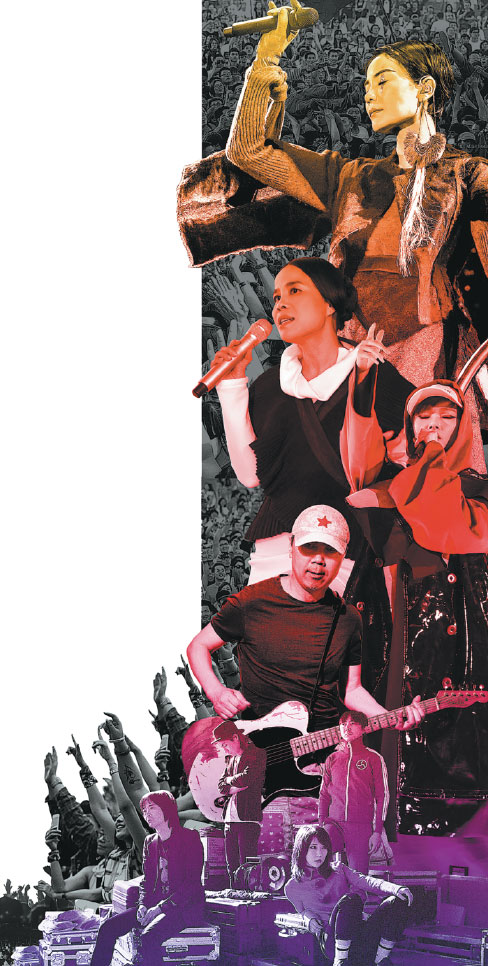Everything to their names
From ballads to hip-hop, the nation pounds to new beats
Cui Jian, a then 25-year-old trumpet player with the Beijing Symphony Orchestra, took part in a concert at the Workers' Stadium in Beijing on May 9, 1986. At the packed venue, Cui performed his original song, Nothing to My Name. When it ended, a rock star had been born.

The song opened a chapter in China's rock music story at a time when few Chinese knew what rock 'n' roll was. It also marked the start of a journey, which would later make Cui China's "godfather of rock 'n' roll". In 1995, he went on his first tour of the United States with a total of six shows in Boston, San Francisco and New York.
For audiences on the Chinese mainland, especially young fans, the song has become a collective memory. Following the fashion style of their rock idol - long hair, jeans and boots - they cheered wildly and danced in the aisles when Cui performed it. They also interpreted Nothing to My Name in their own ways, declaring their individuality.
As Cui said, thanks to that era, when young people needed that kind of energy and the message delivered by this number, "the song became a hit and I became famous".
The members of his band were classically trained like Cui. One of them, Liu Yuan, learned the suona, a Chinese wind instrument, with his father as a child and later worked with the Beijing Singing and Dancing Troupe. He became interested in jazz in the 1980s and taught himself to play saxophone. As owner of the East Shore Live Jazz Cafe in Beijing, Liu has trained many young Chinese jazz musicians.
Chinese rock musicians and bands started to emerge in the 1980s. Influenced by Western rock, they expressed themselves through original material. In 1994, the Chinese Rock Power concert was held in Hong Kong. Bringing together He Yong, Dou Wei, the former lead vocalist of Black Panther, Zhang Chu and rock band Tang Dynasty, the concert was the first time mainland musicians had performed in Hong Kong. It stunned local audiences and created the momentum for a wave of rock to wash across the country.
The founding of Modern Sky, one of the largest indie record labels, by former rocker Shen Lihui in 1997, marked the arrival of a more vibrant rock music scene in China.
Home to more than 100 bands and indie musicians, the label signed groups from the United Kingdom and the US after opening offices in London and New York. The founder of the Strawberry Music Festival in the US, the label has also held festivals in New York and Helsinki, the Finnish capital, introducing Chinese bands to the world stage.
China's indie rock scene continues to thrive, with a new generation of musicians whose output is more diverse compared with those in the 1980s and '90s. Heavily influenced by alternative, punk, grunge and other rock genres, its scope has extended from Beijing to more--vibrant cities such as Chongqing, Chengdu, capital of Sichuan province, and Wuhan, capital of Hubei province.
Like rock, Chinese pop emerged in the 1980s and soon gained a large fan base. Homeland Love, a mellow ballad written by Ma Jinghua and Zhang Peiji, is considered the first original pop song from the mainland. It was first performed by the singer Li Guyi in 1980, when she was 36.
In contrast to the solid style of singing with a wide vocal range that dominated the country's music scene at the time, Li performed the song sweetly, softly and romantically.
In 1983, when Li was invited to perform six songs at China Central Television's first Spring Festival Gala, known as chunwan in Chinese, she performed Homeland Love, which became a hit and remains one of her most popular songs. The gala, broadcast on Lunar New Year Eve, is one of the most-watched annual shows in the country.
In 1995, singer-songwriter Zhu Zheqin, known as Dadawa in the West, released her second album, Sister Drum, which saw her become the first Chinese musician to release music globally. Collaborating with producer-composer He Xuntian, Zhu was inspired by folk music after traveling to the Tibet autonomous region. The album sold more than 3 million copies worldwide.
Hip hop has also been on the rise in China. At the start, the genre was very much underground as a small, grassroots movement aimed at celebrating music and self-expression. But in the summer of 2017, thanks to the reality show The Rap of China, the country's hip hop music scene grew in both size and popularity for the first time.
Contact the writer at chennan@chinadaily.com.cn
|
From top: Pop singer Faye Wong; Singer-songwriter Zhu Zheqin; Super Girl champion Li Yuchun; Rock star Cui Jian; Indie rock band New Pants.Ding Zhenjie/for China Daily/da Huilang/for China Daily/china Daily/song Xiaohui/for China Daily |
(China Daily 09/30/2019 page46)















